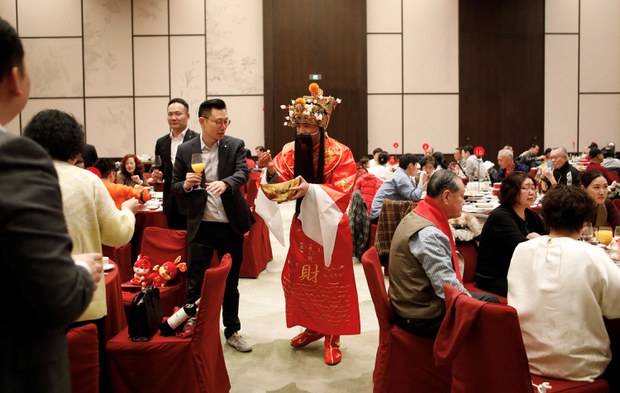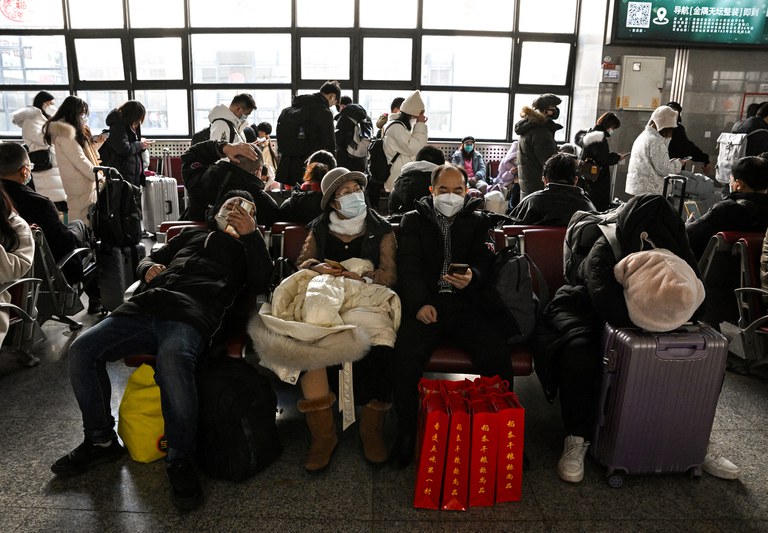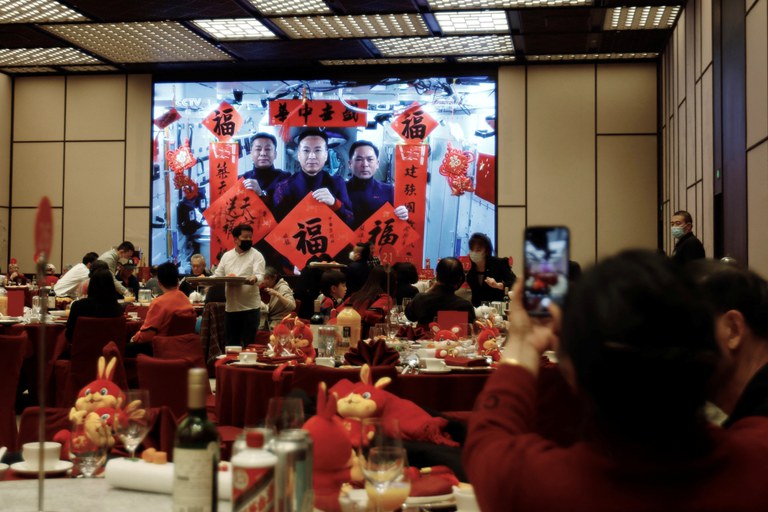China drops Lunar New Year’s Eve as public holiday, sparking outcry
Share

A man dressed as Caishen, the God of Wealth, distributes sweets to diners during a Lunar New Year’s Eve dinner service at Shangri-La Shougang Park hotel in Beijing, Jan. 21, 2023.
The Chinese government has dropped Lunar New Year’s Eve – the night on which families traditionally gather to cook and eat together – as a statutory public holiday, sparking an online outcry and reigniting speculation that the day is considered politically sensitive by Communist Party leader Xi Jinping because it sounds like a call to remove him from office.
An Oct. 25 notice from the General Office of the State Council designated Feb. 10-17 as national holiday, but not Feb. 9, which is the last day of the Year of the Rabbit in the lunar calendar, when families would typically gather for the main meal of the celebration, often traveling thousands of kilometers on public transportation in a mass nationwide rush to make it back in time.
While the notice “encourages” employers to grant that day as paid leave to employees, there is no requirement for them to do so, prompting widespread outrage online.
“No holiday on New Year’s Eve means that migrant workers can’t rush home on New Year’s Eve to cook dinner,” @Dempsey commented on the question-and-answer site Zhihu. “Without New Year’s Eve, it’s not Chinese New Year.”
“It’s the most important part of the Spring Festival,” the user wrote, using the official government term for the holiday.
@FoTanLaiKi agreed, saying “The system has gone crazy,” while @Enthusiastic_citizen_Xiao_Song quipped in reference to a popular video game: “Even the Sims in Sims 4 get a day off on New Year’s Eve.”
In a satirical reference to Xi Jinping’s insistence on “struggle,” @Director Zhang commented: “We are hard-working, able to endure hardship, and love to struggle.”
The move has also reignited speculation that Xi doesn’t like the holiday because its name in Chinese is a homophone for “eliminate Xi.” Chinese speakers use homophonic puns for jokes, in advertising and to evade pervasive internet censorship.
“I think it’s pretty funny that it sounds like ‘get rid of Xi’,” Jiangxi-based businessman Zhang Jia told Radio Free Asia. “But it’s going to be very troublesome for a lot of people.”


A Beijing resident who gave only the surname Wang for fear of reprisals said the authorities had displayed “a lack of human feeling” with the decision.
“How come these people who decide the holidays don’t understand human feelings or culture?” Wang said.
Some commented that the day had lost its official holiday status once before, in 2014, shortly after Xi took power in late 2012.
Hunan resident Cheng Xiaofeng said he believes this is the genuine reason behind this year’s move.
“There are all kinds of taboos around that kind of thing these days, so … I don’t think it’s to revitalize the economy,” Cheng said.
Xi is known to be highly sensitive to criticism, satire, or calls for his resignation, and this kind of associative wordplay isn’t without precedent in Chinese history.
When 20th century warlord Yuan Shikai proclaimed himself emperor, he issued an edict changing the name of the Lantern Festival, which until then had sounded something like the phrase: “No more Yuan.”
Shaking Chinese traditions
User @Diskence209 commented on Zhihu: “The next step will be a ban on celebrating New Year’s Eve, because it sounds too similar to ‘eliminate Xi’.”
“We should never have had it as a holiday in the first place — it’s a Korean festival,” quipped @Li_Lang’s_clever_plan in a reference to the government’s ban on imported cultural customs like Christmas.
“We should be wary of foreign forces playing the traditional card!” the user wrote.
“I am a student and have winter vacation, but my mother won’t get annual leave,” complained @He_Yanyi. “So I won’t be able to see my mother on New Year’s Eve, which is sad. I feel sad for my mother and also sad for myself, who will have to work in future.”
“This has fundamentally shaken the traditions of the Chinese people,” @wxya commented. “Very odd that this was allowed through.”
“I was heartbroken when I saw the news this morning,” @Little_fat_paper added. “A lot of companies won’t take their encouragement and won’t give people the day off on New Year’s Eve.”
“Did the people who came up with this plan do any research?”


User @little_devil_zly commented bitterly, recalling the grueling lockdowns of the three-year zero-COVID policy: “So it’s OK for them to lock down cities for months at a time, but not to give us an extra day off.”
Others wondered what they would eat if there was no time to cook, and came up with an alternative suggestion.
“What should we do if we don’t have the day off and can’t prepare the New Year’s Eve dinner? Isn’t it obvious?” wrote @Good_times_are_yet_to_come, answering their own question: “Ready meals.”
@Zhihu_user said government employees typically get to go home early on New Year’s Eve anyway, even if there’s no public holiday, so they are out of touch with the needs of people outside the government system.
“For them, New Year’s Eve is the same as a holiday. If it is postponed, they can get an extra day of holiday,” they wrote.
@nenhuoo said the officials who came up with the arrangement were “arrogant and out of touch with reality for too long,” and hadn’t considered how long it takes people from rural or remote parts of the country to get home for the celebration.
“They have just estimated travel times and have ignored rural transportation capacity and efficiency issues. Even in affluent rural areas there might just be one shuttle bus a day,” the comment said.
@Sharpen_the_knife_internally said it was just as well that many of China’s national treasures aren’t in government hands.
“Just as well that some of our cultural relics are held with the great powers, such as in the British Museum,” they commented. “Because you never know what … bullshit orders the higher-ups will issue.”
“Ordinary people are miserable under the management of this trash!” they wrote. “And the scary thing is, maybe this is just the beginning, and the ‘good times’ may really be yet to come.”
Translated with additional reporting by Luisetta Mudie.







